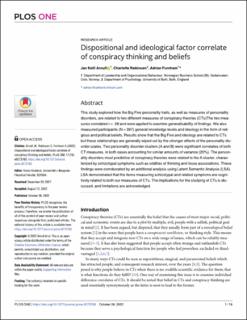Dispositional and ideological factor correlate of conspiracy thinking and beliefs
Others
Published version
Date
2022Metadata
Show full item recordCollections
- Scientific articles [2181]
Original version
10.1371/journal.pone.0273763Abstract
This study explored how the Big Five personality traits, as well as measures of personality disorders, are related to two different measures of conspiracy theories (CTs)The two measures correlated r = .58 and were applied to examine generalisability of findings. We also measured participants (N = 397) general knowledge levels and ideology in the form of religious and political beliefs. Results show that the Big Five and ideology are related to CTs but these relationships are generally wiped out by the stronger effects of the personality disorder scales. Two personality disorder clusters (A and B) were significant correlates of both CT measures, in both cases accounting for similar amounts of variance (20%). The personality disorders most predictive of conspiracy theories were related to the A cluster, characterized by schizotypal symptoms such as oddities of thinking and loose associations. These findings were corroborated by an additional analysis using Latent Semantic Analysis (LSA). LSA demonstrated that the items measuring schizotypal and related symptoms are cognitively related to both our measures of CTs. The implications for the studying of CTs is discussed, and limitations are acknowledged.

